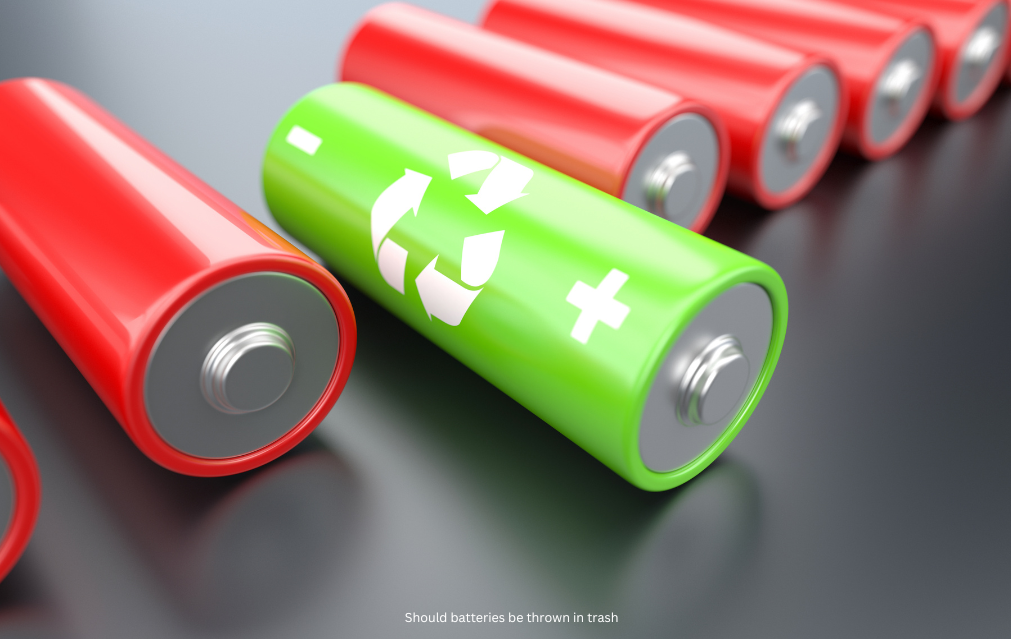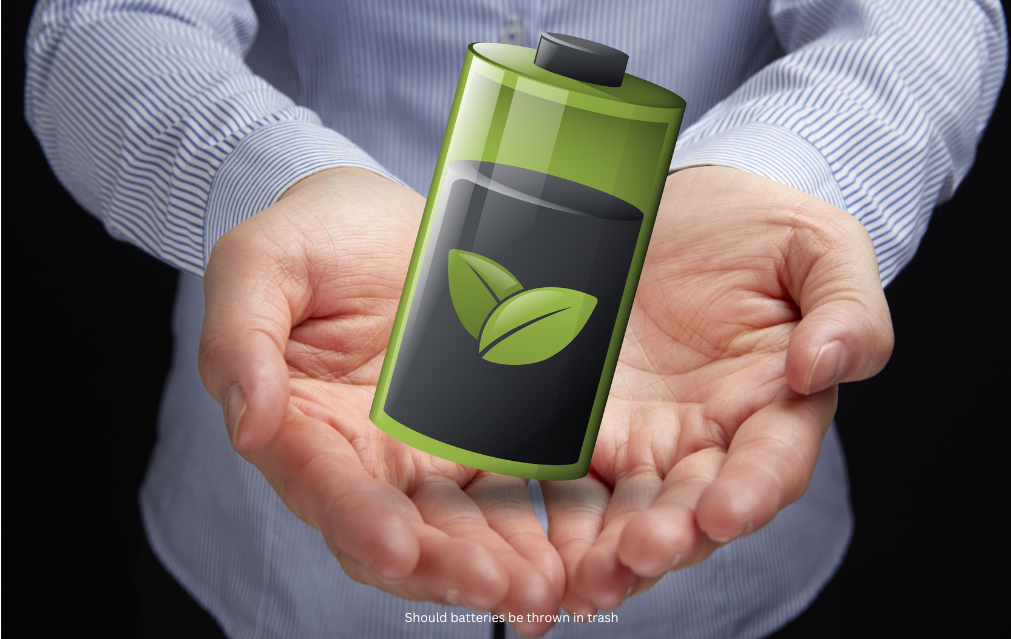Have you ever tossed a used battery in the trash without giving it a second thought? You’re not alone—many people do. But what if we told you that throwing batteries away could be harmful to both the environment and your health? It’s easy to overlook the proper way to dispose of batteries, especially since they come in so many different types.
The problem is, batteries contain harmful chemicals that can leak into the ground and water, causing pollution and damage to wildlife. So, what should you do instead? This post will guide you through why throwing batteries in the trash is dangerous and how to safely dispose of them. You’ll also learn simple steps to protect the planet and your community from the hidden dangers of improper battery disposal.
Let’s dive in and discover why batteries should never be thrown in the trash and how you can make a positive change today!

Understanding What’s Inside Your Batteries
Batteries come in many shapes and sizes, and each type has a different purpose. Let’s take a closer look at the most common ones.
Alkaline Batteries (AA, AAA, 9V, etc.)
These are the batteries you probably use the most. They power everyday devices like TV remotes, clocks, and toys. Alkaline batteries are widely available, but they still contain chemicals that can be harmful if thrown away carelessly.
Lithium-Ion Batteries (used in electronics)
Lithium-ion batteries are in many of your gadgets, like smartphones, laptops, and tablets. They hold a lot of power and are rechargeable, which is why they’re so popular. However, when these batteries are disposed of improperly, they can cause serious harm due to their chemical content.
Lead-Acid Batteries (used in cars)
You’ll find these batteries in your car. They are larger and provide the power needed to start the engine. Lead-acid batteries are filled with lead and sulfuric acid, which are both highly toxic and dangerous to the environment if not disposed of correctly.
Rechargeable Batteries (NiMH, NiCd)
These batteries are found in things like power tools, cameras, and cordless phones. Nickel-Metal Hydride (NiMH) and Nickel-Cadmium (NiCd) batteries can be used multiple times before they lose their charge, but they also contain toxic metals like cadmium, which can be harmful if not disposed of safely.
Why Are These Batteries Hazardous?
Batteries contain toxic substances like lead, mercury, cadmium, and lithium. When these chemicals leak into the environment, they can pollute soil and water. Lead is a heavy metal that can harm your nervous system. Mercury can cause brain damage. Cadmium is a carcinogen, which means it can cause cancer. Lithium, if not handled properly, can cause fires and explosions.
That’s why it’s so important not to throw batteries in the trash. These harmful materials can leach out into the ground and water, endangering plants, animals, and even humans. Proper recycling helps keep these dangerous chemicals out of the environment and reduces the risks associated with improper disposal.
Why Throwing Batteries in the Trash is Dangerous
Batteries may seem small and harmless, but tossing them in the trash can lead to big problems. Let’s look at the dangers of improper battery disposal.
Environmental Impact
When batteries are thrown away, they can break open, releasing toxic chemicals into the environment. These chemicals, like mercury, cadmium, and lead, can seep into the soil and water. This contamination harms plants and animals, and can even make its way into the food chain.
Burning trash with batteries also causes air pollution. The chemicals inside the batteries can release harmful gases into the air, polluting the atmosphere and affecting our health.
Health Hazards
Batteries pose serious health risks to both humans and animals. If a person or animal touches or eats battery waste, it can cause poisoning, skin damage, or other health problems. In fact, many animals mistake batteries for food, which can be deadly if they ingest them.
There have been cases where improper battery disposal led to severe environmental damage. In one case, a landfill filled with improperly disposed batteries leaked toxic chemicals into nearby rivers, harming local wildlife and contaminating drinking water.
Fire & Explosion Risks
One of the most dangerous risks is the potential for fire or explosion. Lithium-ion batteries, commonly found in phones and laptops, can catch fire if damaged or improperly disposed of. When these batteries end up in landfills, they are at risk of being punctured or crushed, which can lead to an explosion.
Real-life incidents have shown how serious this can be. Waste facilities around the world have had fires caused by improperly discarded lithium-ion batteries. These fires can spread quickly and are difficult to put out, causing serious damage to property and the environment.
Throwing away batteries isn’t just an inconvenience—it can lead to lasting damage to the planet and harm to living creatures. Proper disposal and recycling are crucial to prevent these dangers.

What You Should Do Instead: A Guide to Proper Battery Disposal
Instead of tossing batteries in the trash, here are some simple and safe ways to dispose of them properly.
Recycling Options
Many local recycling centers accept used batteries. You can easily find a recycling center near you by checking online resources like Call2Recycle or by visiting your local waste management website. These centers recycle batteries safely, keeping harmful chemicals out of the environment.
Retail stores like Best Buy and Home Depot also collect old batteries for recycling. They have special bins where you can drop off used batteries when you shop. Many of these stores offer free recycling, making it easier than ever to dispose of batteries responsibly.
Safe Storage Before Disposal
Before you throw your used batteries away, take a few simple steps to keep them safe. Always tape the battery terminals with clear tape. This prevents short circuits, which can cause fires. Store your used batteries in a cool, dry place until you’re ready to recycle them. A small box or plastic container works great for storing them safely.
Government Regulations
In many places, there are strict laws about battery disposal. For example, some regions require you to take used batteries to a recycling center instead of throwing them in the trash. These laws exist to protect the environment and prevent hazardous waste from spreading.
Improper disposal of batteries can result in fines or penalties. In some areas, people have been fined for throwing batteries in regular trash. It’s important to know your local laws to avoid trouble and help keep the planet safe.
By following these simple steps, you’re doing your part to protect the environment and ensure batteries are recycled properly!
Common Myths About Battery Disposal: Debunking the Misconceptions
There are many myths about battery disposal that can make people believe it’s okay to throw them away. Let’s clear up some of the most common misunderstandings.
“Alkaline batteries are safe to throw away.”
Some people think alkaline batteries, like AA and AAA, are harmless and can just be tossed in the trash. While it’s true that in some places, this is allowed, recycling is always the better option. Alkaline batteries still contain small amounts of toxic chemicals that can leak into the environment. It’s always best to recycle them instead of throwing them away.
“Batteries are biodegradable.”
This is a big myth! Batteries are not biodegradable. They contain metals like cadmium, lead, and mercury, which take hundreds or even thousands of years to break down. These harmful metals can pollute the soil and water for a very long time. Throwing them in the trash means they will stick around for generations, harming the planet.
“Throwing away one battery won’t make a difference.”
It’s easy to think that throwing away one battery won’t matter much. But when millions of people think the same way, the impact adds up quickly. Each battery contributes to pollution, and over time, the cumulative effect can damage the environment. Even small actions can make a big difference when we all do our part to dispose of batteries correctly.
Now that we’ve debunked these myths, you can see how important it is to handle batteries with care. Proper disposal protects both the environment and our health!
Conclusion & Call to Action
To sum it up, throwing batteries in the trash can cause serious harm to the environment and our health. Batteries contain toxic chemicals that can pollute soil, water, and air, and they can even cause fires or explosions in landfills. It’s clear that proper disposal is crucial.
So, what can you do? Start by finding a local battery recycling center or take advantage of collection programs at stores like Best Buy and Home Depot. Share this information with friends and family, and help spread the word about the importance of recycling batteries.
Also, consider using rechargeable batteries as a sustainable alternative. These last longer and can be reused many times, reducing waste and keeping harmful chemicals out of landfills.
Let’s all take action today to protect our planet—one battery at a time!
